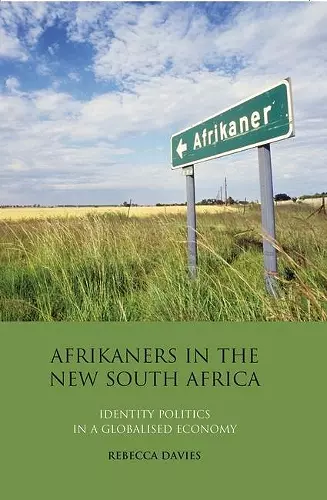Afrikaners in the New South Africa
Identity Politics in a Globalised Economy
Format:Hardback
Publisher:Bloomsbury Publishing PLC
Published:30th Jul '09
Currently unavailable, and unfortunately no date known when it will be back

How has the position of Afrikaners changed since the end of the Apartheid regime in South Africa? This work argues that the global political economy and the closely associated ideology of globalization are major catalysts for change in Afrikaner identifications and positions. It contributes to our understanding of post-apartheid South Africa.
How has the position of Afrikaners changed since the end of the Apartheid regime in South Africa? While the links between Afrikaner nationalist identity and the apartheid regime have been irrevocably altered, it is evident that this newly disempowered minority still commands a vast material and cultural capital. Certain Afrikaans speakers have become important players in the new South Africa and on the world stage. Davies argues that the global political economy and the closely associated ideology of globalization are major catalysts for change in Afrikaner identifications and positions. She identifies multiple Afrikaner constituencies and identities and shows how they play out in the complex social, economic and political landscape of South Africa.Accessible, informative and well-written, "Afrikaners in the New South Africa" is a vital contribution to our understanding of post-apartheid South Africa. It will be indispensable for those interested in South Africa, identity politics, globalization, international political economy and geography.
"'This book will make a major theoretical contribution to the study of Afrikaners, ethnic mobilization and the politics of post-apartheid South Africa. It is well written and [makes] an original contribution to the field.... [T]he author shows us how in the post-apartheid era there has been a deep displacement in Afrikaner identifications. However, as the author equally demonstrates, Afrikaner nationalism remains significant as a political issue in South Africa because of the economic and cultural importance of (White) Afrikaans speakers. The integration of an Afrikaner bourgeoisie into the global political economy is something that contributes to both the strengthening of Afrikaners as an economic bloc at the elite level and also contributes to the increasing interrogation of what it fundamentally means to be an Afrikaner. The varieties of Afrikaner identities and how this plays out in the social, economic and political landscape of South Africa is of great importance and the author has really tackled the subject well. I think it will be a book of great interest to students of South Africa and will be well received by the academic community.' - Professor Ian Taylor, School of International Relations, University of St. Andrews 'This book skilfully explores the place and identity of 'Afrikanerdom' in post-apartheid South Africa.... The principal finding of the book is that the ideology of globalisation has acted as a major catalyst for change in Afrikaner identifications, resulting in these groups 'successfully' adapting to the post-apartheid agenda. In short, class-orientated and capital driven coalitions between the Afrikanerdom and the African National Congress have acted to preserve the privilege and power of Afrikaners. However, in so doing, the ethnic character and identities that previously prioritised and valued Afrikaner solidarity have been questioned and undermined. This book therefore makes an important contribution to our understanding of post-apartheid South Africa and provides a detailed empirical case study of the impacts of globalisation on identity reconstruction in a society in transition. The book will appeal to theorists, students and other readers concerned about globalisation and identity. It will be of particular interest to students reading International Political Economy, International Relations and Geography.' - Professor Richard Gibb, School of Geography, University of Plymouth"
ISBN: 9781845117856
Dimensions: unknown
Weight: unknown
208 pages